Datebook: Filming World War II, sensory art from South America, summer happenings at the Broad and the Getty
The life-changing work of a crew of American filmmakers. Early light and space art by key South American artists. And a soundtrack for the apocalypse. Here are five exhibitions and events to check out in the coming week:
John Ford, Samuel Fuller, George Stevens, “Filming the Camps: From Hollywood to Nuremberg,” at the Los Angeles Museum of the Holocaust. Organized by the Mémorial de la Shoah in Paris, this exhibition looks at the vital work done by three key American filmmakers during World War II. Ford, Fuller and Stevens, in the employ of the U.S. Armed Forces and the Secret Services, filmed key aspects of the war — including the liberation of the Nazi concentration camps. The show includes film footage, personal letters, important ephemera and other rare objects and reflects on the way in which playing witness to Nazi atrocities shaped the worldview of these important directors. There could not be a more timely moment for this exhibition. Opens Sunday and runs through April 30. 100 S. Grove Dr., Fairfax District, Los Angeles, lamoth.org.
“Kinesthesia: Latin American Kinetic Art, 1954-1969,” by Palm Springs Art Museum. Paris has long been thought of as the heart of the kinetic art movement — art that plays with light, form and shape to create a sensory experience. But this exhibition, organized by guest curator Dan Cameron as part of the Pacific Standard Time: Los Angeles / Latin America series, looks at the contributions to the movement by important South American figures. This includes innovative work by key figures as Carlos Cruz-Diez, Julio Le Parc and Martha Boto. Definitely worth a weekend in the desert. Opens Saturday and runs through Jan. 15. 101 N. Museum Dr., Palm Springs, psmuseum.org.
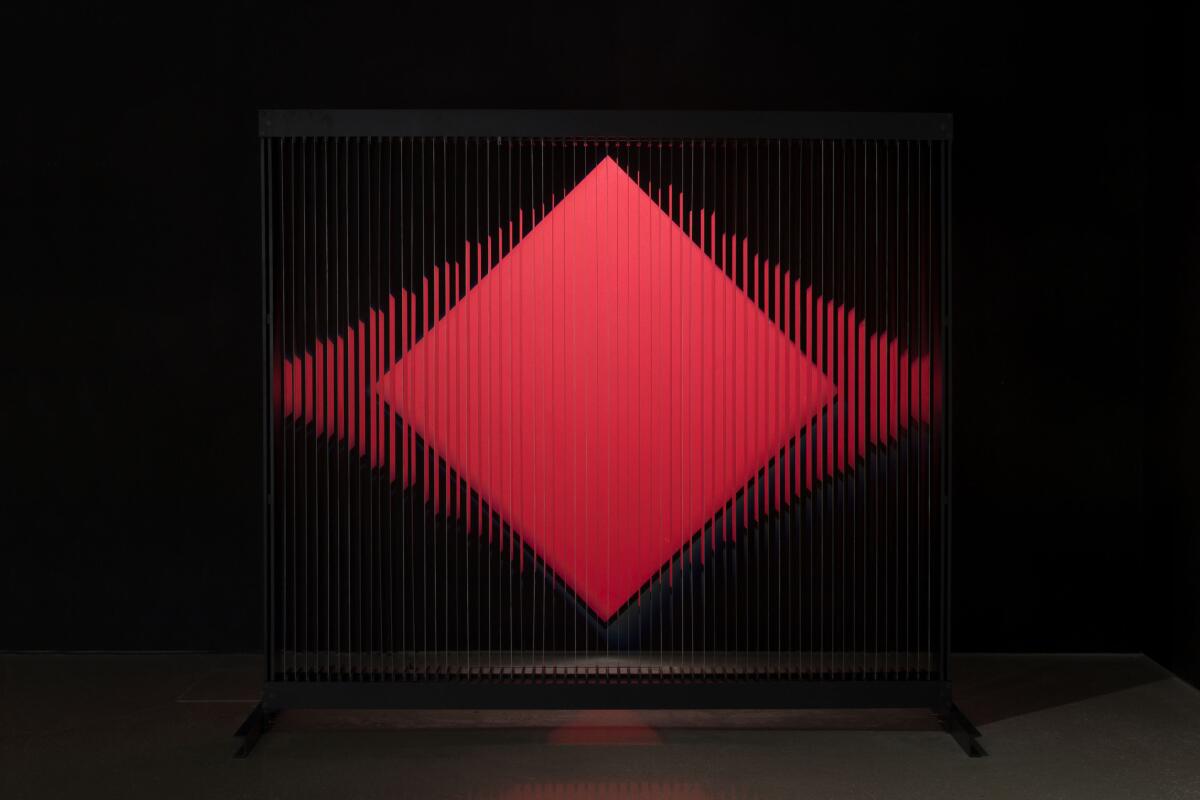
“Summer Happenings: Oracle,” at the Broad. Los Angeles artist Ron Athey (he of the visceral body art) and filmmaker James Spooner (“Afro-Punk”) have teamed up to produce a summer happening that will feature “a soundtrack for the apocalypse” (courtesy of the band A Place to Bury Strangers) as well as blessings courtesy of performance artist Linda Mary Montano channeling Mother Teresa. Because right now we could use all the blessings we can get. This Saturday at 8 p.m. 221 S. Grand Ave., downtown Los Angeles, thebroad.org.
Friday Flights at the Getty Museum, with Kenyatta A.C. Hinkle, Psychic Ills and Scott Benzel. The Getty’s summer nights series is bringing together a cluster of interesting artists, including musicians Psychic Ills and sound artist Scott Benzel. But perhaps most intriguing will be the performance by Kenyatta A.C. Hinkle, in collaboration with Tyler Matthew Oyer and the Kevin Robinson Ensemble. For her piece, titled “Exploring the Nowannago,” the artist will engage in a double-noose tug-of-war with Oyer that also serves to explore the narrative of the fictional “Kentifrica.” Friday at 6 p.m. 1200 Getty Center Dr., Brentwood, Los Angeles, getty.edu.
“Artists of Mexico: Paintings, Drawings, Prints, Sculpture,” at Jack Rutberg Fine Arts. A group show looks at the Mexican artists who have had an important resonance in Los Angeles, including key Mexican masters such as Rufino Tamayo, David Alfaro Siqueiros and Rufino Tamayo. This includes those who have influenced artists in the area, along with others who have labored in the city — such as Siqueiros, who spent six months living in L.A. in 1932, during which time he painted his famously controversial mural at Olvera Street, “America Tropical.” Through Sept. 30. 357 N. La Brea Ave., Fairfax District, Los Angeles, jackrutbergfinearts.com.
Last chance
Marcos Rios, “My mind is alive with thoughts of my sadness,” at Mandujano Cell. Rios creates theatrical installations out of photography, sculpture and painting that employ slapstick to explore heavy topics such as failure, death and despair. Through Saturday. 171 N. La Brea Ave., No. 204, Inglewood, mandujano-cell.com.
John Mason, “Sculpture: 1958-1969,” at Kayne Griffin Corcoran. An exhibition of key works by the Los Angeles sculptor (who showed at Ferus Gallery back in the day) gathers works from 1958 to 1969 — monumental pieces that often explored the limits of his materials. Included in the show, organized by former L.A. gallerist Frank Lloyd, will be a pair of early vertical sculptures that bear totemic qualities. Through Saturday. 1201 S. La Brea Ave., Mid-Wilshire, Los Angeles, kaynegriffincorcoran.com.
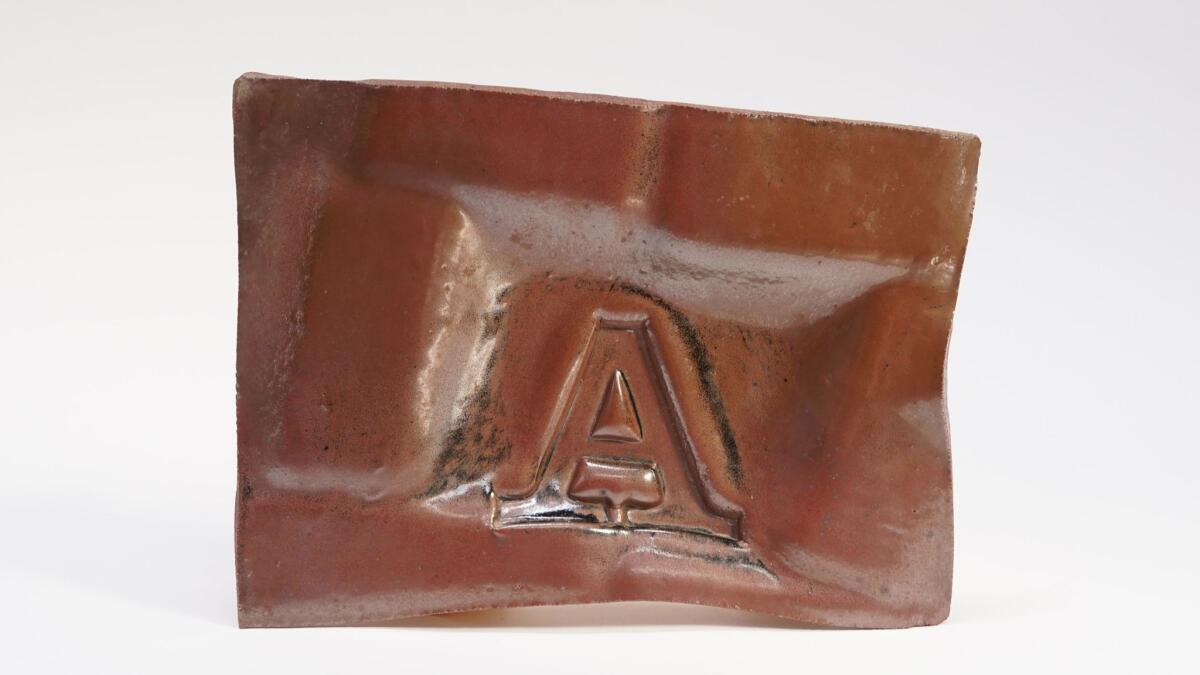
“Figurative Futures,” at 101/Exhibit. A group show organized by curator Mark Murphy features work by 24 contemporary artists working in a wide range of media — including painting, fiber arts, sculpture and mixed media. All were chosen for the fresh ways in which they approach the human figure. Featured artists include Hugo Crosthwaite, Richard Downs, Trenton Doyle Hancock, Marco Zamora and Sophia Narrett. Through Saturday. 668 N. La Peer Drive, West Hollywood, 101exhibit.com.
Mary Ellen Carroll, “1963 (Outtakes, Aftermaths and Assassinations),” at Redling Fine Art. The conceptual artist takes the year 1963 as a point of inspiration, indexing the year’s images so that one image represents every day of the year. From these, Carroll has created a painting to represent each day. In this show at Redling, she shows six works from this series — “indexed under the subjects of aftermath, altering perception, and assassination.” Through Saturday. 6757 Santa Monica Blvd., Hollywood, redlingfineart.com.
“From the Desert to the Sea: The Desolation Center Experience,” at Cornelius Projects. Today, we have Coachella. In the early ’80s, there was Desolation Center, a series of site-specific concerts held in the desert that were a little bit DIY and a lot of punk. (Audiences would arrive by rented school bus. No one Instagrammed.) Key musicians included Sonic Youth, Meat Puppets and Einstürzende Neubauten, and on-site art was provided by the likes of Survival Research Laboratories. The exhibition features painting, photography, sculpture and other ephemera related to the shows. Through Sunday. 1417 S. Pacific Ave., San Pedro, corneliusprojects.com.
“No Justice, No Peace: LA 1992,” at the California African American Museum. A historical exhibition looks at the myriad social and political forces that led to the 1992 riots in the wake of the
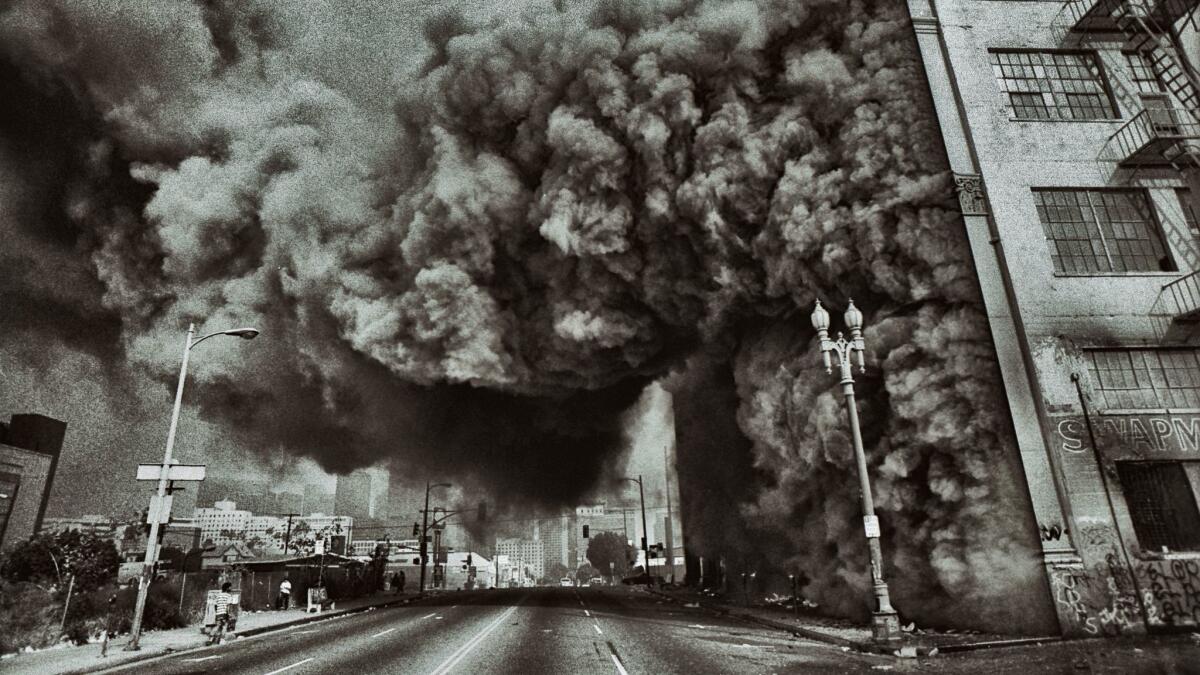
“Summery Appeal,” at the Good Luck Gallery. Curator Doug Harvey has organized a group exhibition that brings together pieces from several Southern California Progressive Art Studios, nonprofit programs geared to artists with developmental disabilities. Taking the theme of summer — and ideas of warmth and leisure — the show features 50 artists, including figures such as Dru McKenzie, Jackie Marsh and Lupe Carbajal. Through Sunday. 945 Chung King Rd., Chinatown, Los Angeles, thegoodluckgallery.com.
“NOEMA,” at the El Segundo Museum of Art. A show about diagramming features, at its heart an epic 27-foot piece by Matthew Ritchie that was created in collaboration with the Getty Research Institute and charts the entire history of human diagrams. This was obviously designed for a geek like me. Through Sunday. 208 Main St., El Segundo, esmoa.org.
“Living Apart Together: Recent Acquisitions,” at the Hammer Museum. A new installation gathers recent additions to the museum’s permanent collection — gifts from donors and artists, as well as museum acquisitions — with an emphasis on art made over the last decade in Los Angeles. A good opportunity to see what’s been cooking in the old hometown. Through Sunday. 10899 Wilshire Blvd., Westwood, Los Angeles, hammer.ucla.edu.
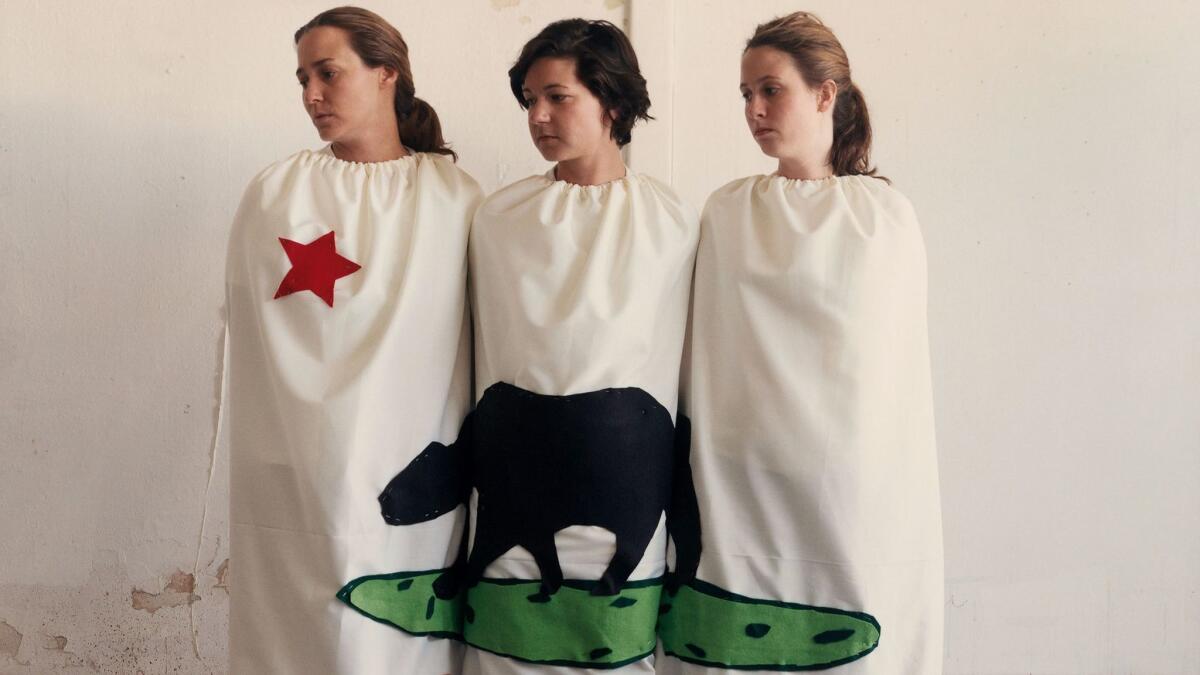
Ongoing exhibitions
Elizabeth Axtman, “The Ride to Back to Black,” at Residency. A solo show by the Oakland-based artist examines the journey of black public figures who minimize their race in order to be accepted by the majority. (Think: O.J. Simpson’s declaration, “I’m not black, I’m O.J.”) The works in the show look at the idea of wanting to belong — and what happens when some of these high-profile entertainers and athletes discover that they have not been able to transcend race at all. Through Aug. 31. 310 E. Queen St., Inglewood, residencyart.com.
“Maiden LA,” in locations around Los Angeles. Featuring more than 140 projects around Los Angeles County, this monthlong arts fest consists of exhibitions, performance and events in alternative and artist-run spaces. This will include open studios held by artists and architects, a peephole cinema and storytelling workshops led by artist Nicole Rademacher. See the website for a complete listing of exhibitions and events. Through August. In locations around L.A., maiden.la.
Dennis Hopper, “The Lost Album,” at Kohn Gallery. In addition to being an actor, Hopper was a devoted photographer, who, for a period of 10 years, principally in the ’60s, carried his camera with him wherever he went. In the process, he captured scenes on the street, celebrities at rest and his artist friends (figures such as Ed Ruscha and Billy Al Bengston). The exhibition is drawn from an archive of more than 400 photographs that sat untouched in a box until after the artist’s death in 2010. An adjacent space is showing works by Hopper contemporaries John Altoon, Wallace Berman, Bruce Conner and others. Through Sept. 1. 1227 N. Highland Ave., Hollywood, kohngallery.com.
“Prison Art Collective: Beyond the Blue,” at CB1 Gallery. This exhibition features paintings, drawings and other handmade by artists participating in the California University San Bernardino Community-based Art prison Arts Collective project. These explore various subject areas, including the experience of incarceration. While you are there, stick around for the summer group show, “Hot Time, Summer in the City,” featuring works by the gallery’s stable of artist. Through Sept. 2. 1923 S. Santa Fe Ave., downtown Los Angeles, cb1gallery.com.
2017 California Pacific Triennial, at the Orange County Museum of Art. The latest iteration of OCMA’s biennial looks at issues of architecture and urban design and their ever evolving features. This includes installations by 25 artists from throughout the Pacific Rim, including L.A.-based artist Olga Koumoundouros, known for working with fallow structures; Nancy Popp, who has studied issues of displacement related to the Olympics in Rio de Janeiro; Korea-born artist Haegue Yang, who employs elements of domestic architecture in elaborate installations; and Teddy Cruz, of Estudio Teddy Cruz, in collaboration with Fonna Forman, both of whom run the Cross-Border Initiative at UC San Diego. Through Sept. 3. 850 San Clemente Drive, Newport Beach, ocma.net.
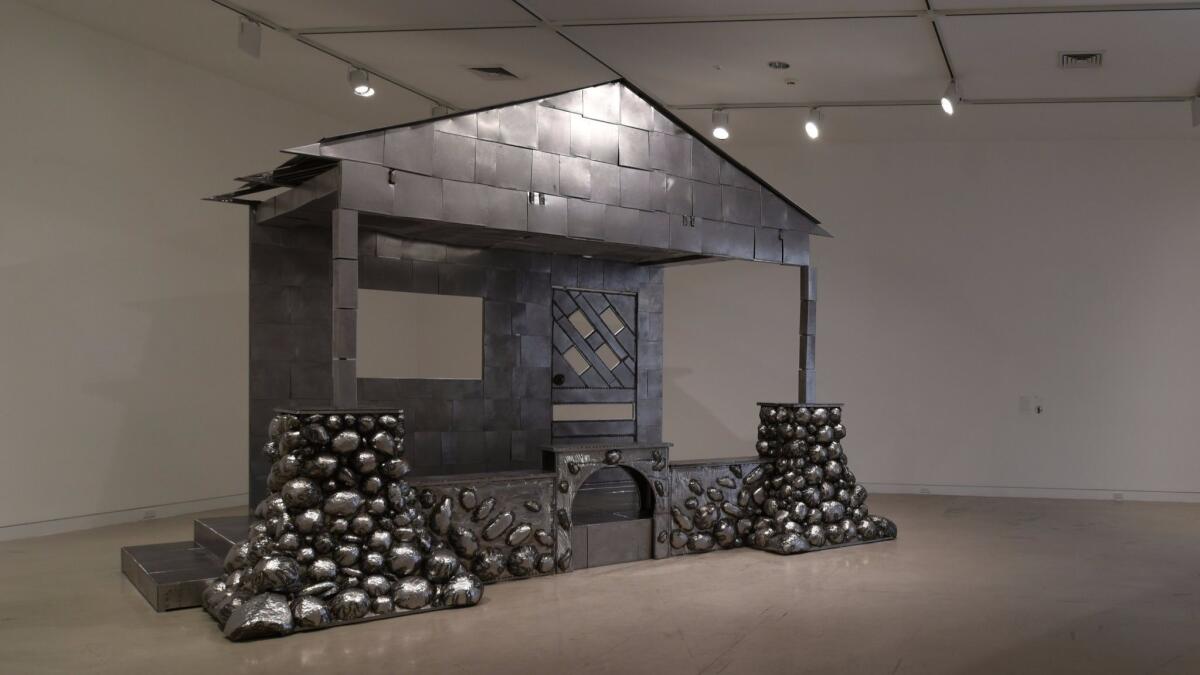
“Frida Kahlo: Through the Lens of Nickolas Murray,” at the Museum of Latin American Art. For almost a decade in the 1930s and ’40s, the Hungarian-born photographer Nickolas Murray photographed Mexican painter Frida Kahlo at home and at work. This exhibition gathers 46 black and white and color photographs of the Mexican artist, as well as copies of the correspondence they exchanged. Through Sept. 3. 628 Alamitos Ave., Long Beach, molaa.org.
Luis Tapia, “Cada Mente es un Mundo,” at the Museum of Latin American Art. This solo presentation features new and recent works by the Santa Fe-based artist, who is known for creating work that is inspired by the techniques of traditional craft — but uses it to address a range of modern themes, including Chicano identity. Through Sept. 3. 628 Alamitos Ave., Long Beach, molaa.org.
John Divola, “Physical Evidence,” at Gallery Luisotti. The long-time SoCal artist, who was featured in the most recent Whitney Biennial, is known for his stark pictures of abandoned domestic spaces that often bear wry bits of his own alterations. The show brings together two major bodies of work: the “Five Prints Portfolio” from the 1980s and “Untitled, 1990,” from the following decade — which though seemingly opposite in nature (one bursts with color and objects, the other is abstracted black and white) are both about the thin line between the real and the artificial. Through Sept. 9. Bergamot Station, 2525 Michigan Ave., No. A2, Santa Monica, galleryluisotti.com.
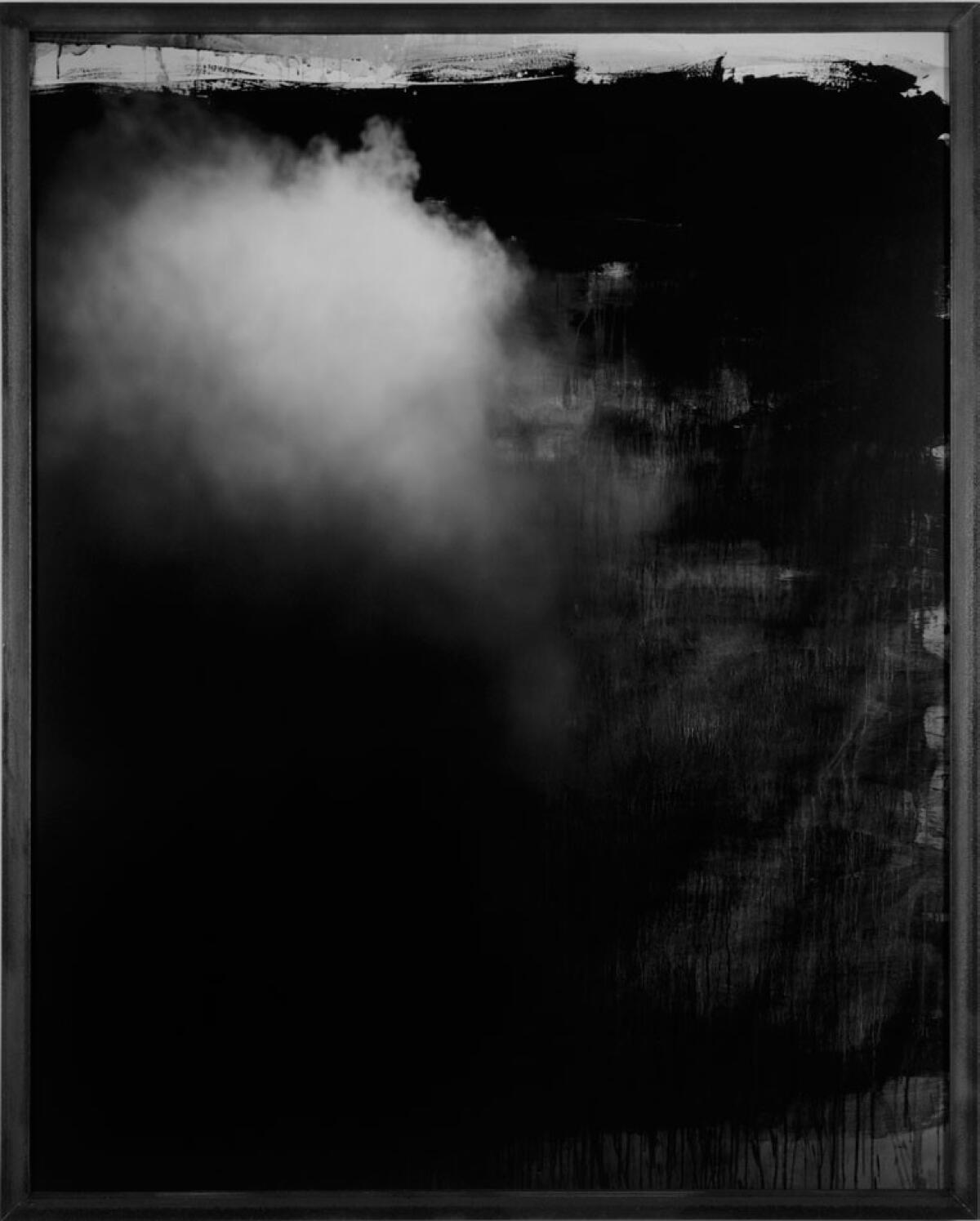
“Los Angeles to New York: Dwan Gallery, 1959-1971,” at the L.A. County Museum of Art. Previously on view at the National Gallery of Art in Washington, this exhibition tracks the legacy of one of the most important postwar galleries in the United States — a space that, for a time, operated in Los Angeles. Its proprietor, Virginia Dwan, wasn’t simply a run-of-the-mill gallerist, she was a patron, supporting artists with stipends and studios. She staged one of the earliest pop art exhibitions and she was an important supporter of minimalism. Plus, she was key in helping artists execute the most outrageous works — including important land art pieces such as Robert Smithson’s “Spiral Jetty.” Talk about thinking big. Through Sept. 10. 5905 Wilshire Blvd., Mid-Wilshire, www.lacma.org.
“Illuminating Women in the Medieval World” at the Getty Museum. Drawn from the museum’s collection of medieval illuminations, this exhibition pulls together images that represent the medieval woman in various guises: as biblical heroines, saints and nuns. The show also explores the ways in which women contributed to the production of manuscripts during that era. Through Sept. 17. 1200 Getty Center Dr., Brentwood, Los Angeles, getty.edu.
Paul McCarthy, “Spinoffs, Wood Statues, Brown Rothkos,” at Hauser & Wirth. McCarthy is known for tackling the grotesque and the excessive in American culture. This show features nine monumental carved black walnut sculptures that are part of his continuing examination of the 19th century German fairy tale “Snow White,” along with Disney’s more Modern interpretation — but in ways that are hardly about happy endings. Through Sept. 17. 901 E. 3rd St., downtown Los Angeles, hauserwirthlosangeles.com.
Sean David Christensen and Michael Nannery, at the Grand Central Art Center. On view is video by Sean David Christensen that explores his father’s manic depression and an experimental interior garden by Michael Nannery. Through Sept. 17. 125 N. Broadway, Santa Ana, grandcentralartcenter.com.
Jim Shaw, “The Wig Museum,” at Marciano Art Foundation. Shaw is a Los Angeles artist who has long been obsessed with marginal religious movements and secretive social orders. Which makes him the perfect artist to take over the cavernous theater at the Marciano Art Foundation, which once served as a masonic temple. (Among the various collections in his studio, Shaw maintains a box of masonic wigs.) For this installation, he has employed vintage masonic theater backdrops that were found at the space for a sprawling diorama that riffs on the themes that preoccupy him most: capitalism and its discontents. Also on view is an exhibition of works from Marciano’s private collection. Through Sept. 17. Admission is free but advance reservations are required. 4357 Wilshire Blvd., Windsor Square, Los Angeles, marcianoartfoundation.org.
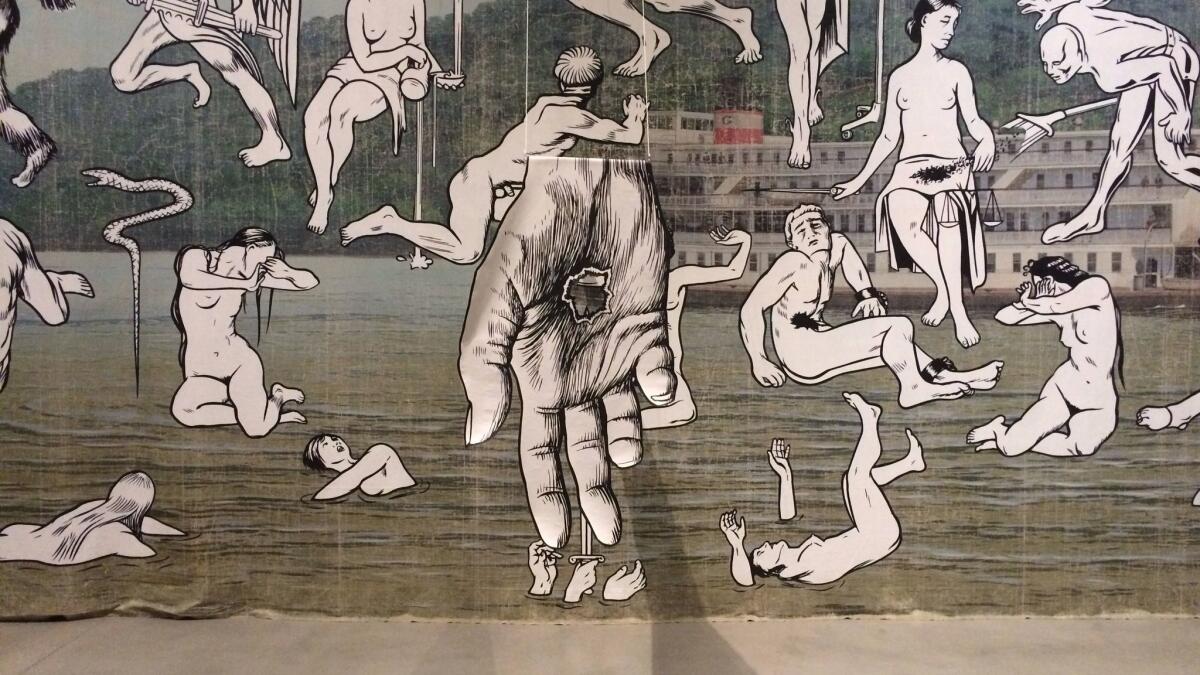
“Down and to the Left: Reflections of Mexico in the NAFTA Era,” at Armory Center for the Arts. A group exhibition featuring work by a range of Mexico and U.S-based artists takes as its point of departure the ’90s NAFTA years, a period of great change, when Mexico came out of a relative period of isolation, and when the local and the global became one. It was also a time when the Zapatista rebellion against the government had galvanized indigenous people and international audiences. Many of the works on view by artists such as Javier Téllez, Nao Bustamante, Lourdes Grobet and Pedro Mayer deal with this climate of economic and political unrest. Through Sept. 17. 145 N. Raymond Ave., Pasadena, armoryarts.org.
Phil Dike, “At the Edge of the Sea,” at the Laguna Art Museum. Raised in Redlands in the early part of the 20th century, Dike was a story designer for Walt Disney (working on animated classics such as “Fantasia”) and also taught at Chouinard (which ultimately became CalArts), and later, Scripps College. But he also painted — watercolor sketches that captured wind, sand and sea. At first, he did this in literal ways. Later in his career, he reached toward the purely abstract. This show gathers 40 years of works from the California regionalist, featuring more than 60 paintings, including many that have never before been seen. Through Sept. 24. 307 Cliff Dr., Laguna Beach, lagunaartmuseum.org.
Star Montana, “I Dream of Los Angeles,” at the Main Museum. Montana is an artist known for her stark, formally posed photographic portraits — a style she employs on the everyday denizens of Los Angeles, including people she meets on the streets in her native Boyle Heights as well as others that she has met through open calls. This show gathers various new works. The museum will also have an exhibition devoted to Alice Könitz’s prototypes for new types of museum seating. Through September 24.114 W. 4th St., downtown Los Angeles, themainmuseum.org.
“Maven of Modernism: Galka Scheyer in California,” at the Norton Simon Museum. This exhibition examines the life of a key art dealer: Galka Scheyer, who embraced Modern work early in the 20th century and was partly responsible for bringing the artists known as the “Blue Four” to prominence in the United States. (They were Lyonel Feininger, Alexei Jawlensky, Paul Klee and Vasily Kandinsky.) Born in Germany in the late 19th century, she ultimately settled in California, where she lived in San Francisco and later in Hollywood, where she found an audience that was open to the work and its ideas. The exhibition contains work by the Blue Four, but also objects and other artworks that connect to Scheyer’s personal and professional life. Through Sept. 25. 411 W. Colorado Blvd., Pasadena, nortonsimon.org.
“Space is the Place,” at C. Nichols Project. Besides presidential tweeting, the other big story we got sucked into this season was the solar eclipse. Thankfully, there’s an art show for that: “Space is the Place” features “Night Sky” prints by Vija Celmins, depictions of deep space objects by Russell Crotty and a painting inspired by a National Geographic image of a corona by Jack Goldstein. There are many other works too — by artists from L.A. and beyond. Through Sept. 21. 12613 ½ Venice Blvd., Mar Vista, cnicholsproject.com.
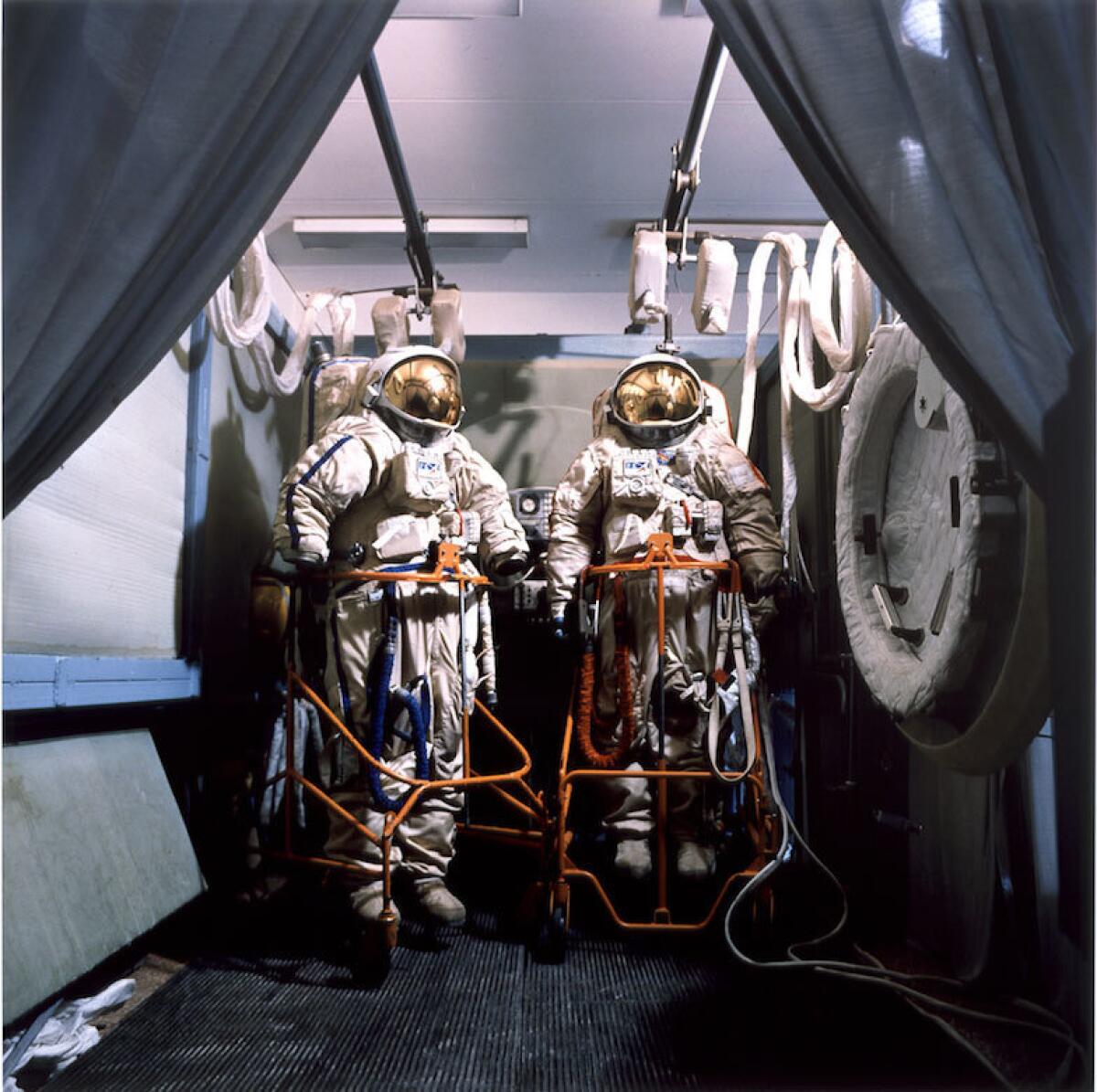
Robert Grosvenor, at Maccarone. The gallery is showing three large-scale sculptures by the New York City artist, known for producing works that often seem to defy gravity. (Times art critic Christopher Knight notes the power of the piece he currently has on view at
“Sea Sick in Paradise,” at the Depart Foundation Malibu Village. A group show organized by Amy Yao looks at that righteous point where art and surfing intersect — touching on surf culture and history, as well as environmental concerns. This include a mix of pieces by Billy Al Bengston, Jeff Ho, Stanya Kahn, Margaret Kilgallen, Barry McGee, Roe Etheridge and Tin Ojeda — among many others — at a pop-up space in Malibu. Through Sept. 30. 3822 Cross Creek Road, Malibu, departfoundation.com.
“Gary Simmons: Fade to Black,” at the California African American Museum. In a new lobby installation — one that takes full advantage of the size and scale — Simmons pays tribute to forgotten African American actors and films. On a black background, the L.A. artist features the titles and names of films and individuals important to the early days of Hollywood history, but forgotten over time. The installation offers a good point of connection with the new exhibition “Center Stage: African American Women in Silent Race Films,” which features posters and screenings of pioneering films. Also on view is a pretty terrific exhibition of portraiture called “Face to Face,” featuring standout works by Lynette Yiadom-Boakye, Titus Kaphar and Mequitta Ahuja. The Simmons installation is on view through July 2018; “Face to Face” is up through Oct. 8 and “Center Stage” through Oct. 15. 600 State Drive, Exposition Park, Los Angeles, caamuseum.org.
“Home — So Different, So Appealing,” at the Los Angeles County Museum of Art. This is the first of the Getty-funded Pacific Standard Time: Los Angeles / Latin America series — and it couldn’t land at a better social and political moment. The show, a collaborative effort between LACMA, the Museum of Fine Arts Houston and UCLA’s Chicano Studies Research Center, thoughtfully explores the way in which Latino and Latin American artists have used elements of the domestic to comment on issues of the personal and the political in art. The assembled works — by figures such as Felix Gonzalez Torres, Luis Camnitzer and Leyla Cardenas — include installations that ruminate on immigration, urban architecture, control and subtle resistance. The conversation piece? Perhaps Daniel Joseph Martinez’s recreation of a spliced Unabomber cabin painted in Martha Stewart shades. Through Oct. 15. 5905 Wilshire Blvd., Mid-Wilshire, Los Angeles, lacma.org.
“Becoming America: Highlights From the Jonathan and Karin Fielding Collection,” at the Huntington Library. The Huntington has just redone its American art galleries and now features a new expansion by architects at Frederick Fisher and Partners that adds eight rooms for display. Up first is an exhibition devoted to the Fielding Collection, featuring more than 200 works of 18th and early 19th century American art, including paintings, furnishings and decorative art. Through Oct. 28, 2019. 151 Oxford Road, San Marino, huntington.org.
“We Are Here/Estamos Aquí,” at SDSU’s Downtown Gallery. A group exhibition looks at the ways in which artists have tackled the question of the U.S.-Mexico border in photography — be it installation, landscape portraiture or still life. The show includes work from both sides of the border, including pieces by Ingrid Hernandez, Stefan Falke, Tom Kiefer, Pieter Wisse and the group Borderclick. Through Oct. 29. 725 W. Broadway, San Diego, art.sdsu.edu.
“Playing With Fire: Paintings by Carlos Almaraz,” at the Los Angeles County Museum of Art. He was an activist and artist, a founder of the groundbreaking collective Los Four, but also a singular painter whose deeply saturated visions of Southern California — its car crashes and its landscapes — bordered on the hallucinatory. This exhibition represents the first major survey devoted to the Los Angeles artist, who died at the age of 48 from AIDS-related complications. The show features 65 works and will be accompanied by the publication of the first full-length monograph devoted to Almaraz’s life and work. Through Dec. 3. 5905 Wilshire Blvd., Mid-Wilshire, Los Angeles, lacma.org.
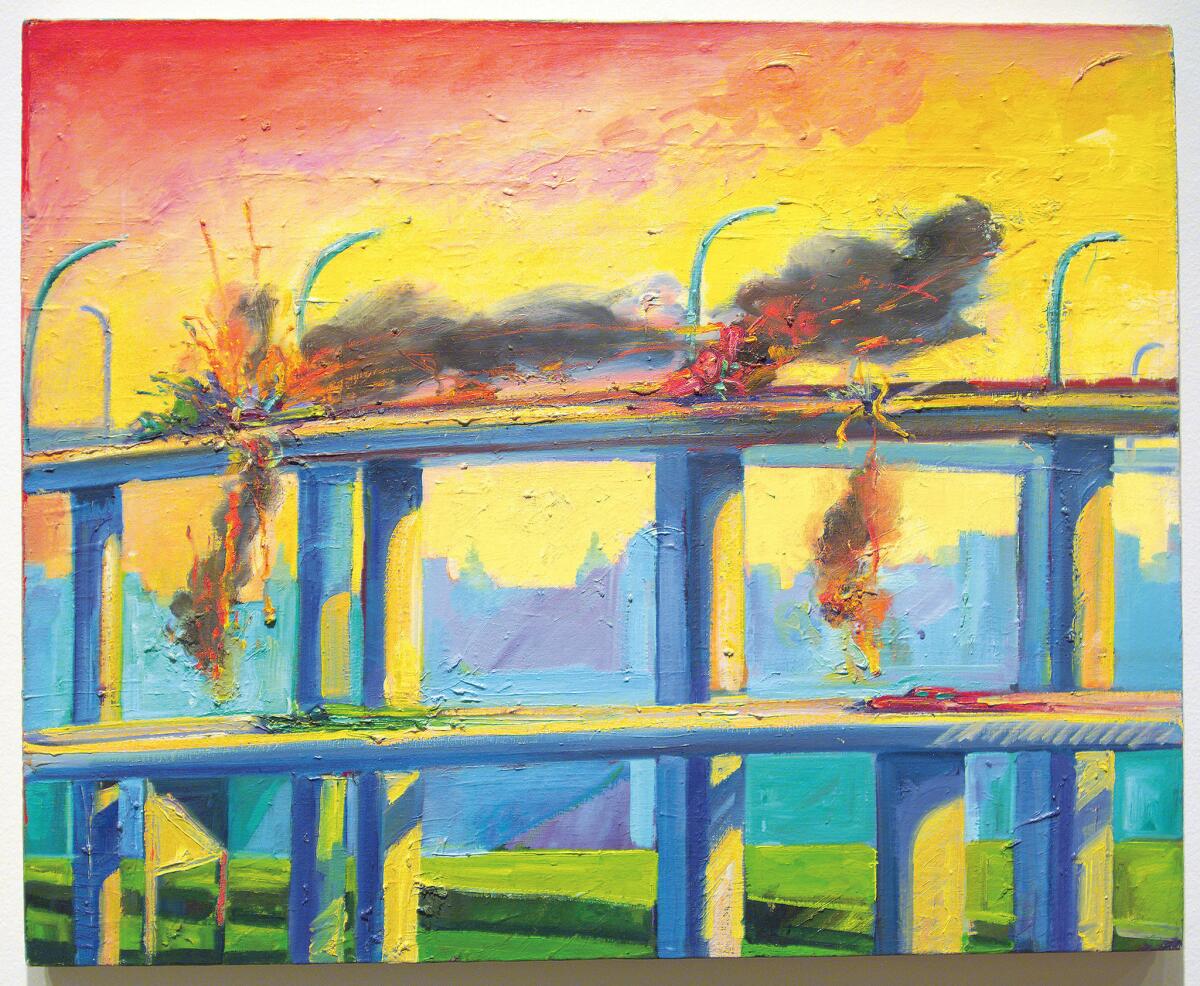
“¡Mírame! Expressions of Queer Latinx Art,” at La Plaza de Cultura y Artes. A group show brings together artists from various Latino backgrounds who explore issues of sexuality and identity in their art, including Xandra Ibarra, Alma Lopez, Julio Salgado and noted photographer Laura Aguilar, known for the striking portraits she creates of herself and others. Through Dec. 9. 501 N. Main St., downtown Los Angeles, lapca.org.
Fran Siegel, “Lineage Through Landscape: Tracing Egun in Brazil,” at the Fowler Museum. A large-scale drawing project by the Long Beach-based artist was inspired by a recent residency in Brazil, where she conducted research in, among other places, the Island of Itaparica, an important center of Afro-Brazilian religious practice. Her 40-foot-long piece consists of a weaving that brings together strips of fabric and drawings of sacred plants on translucent film — a record of the landscapes she inhabited, and the troubled histories some of those represent. Through Dec. 10. An artist talk will be held on Aug. 27 at 3 p.m. UCLA, 308 Charles E. Young Drive North, Westwood, Los Angeles, fowler.ucla.edu.
“We the People: Serving Notice,” at the American Museum of Ceramic Art. Directly engaging the complicated politics of our era, the museum has invited a range of ceramics artists to create works that “serve notice” on a range of contemporary issues, including immigration, human rights, freedom of speech and myriad other topics. This includes work by Jessica Putnam-Phillips, Peter Olson, Robert Lugo and many others. Through Dec. 30. 399 N. Garey Ave., Pomona, amoca.org.
Anna Maria Maiolino, at the Museum of Contemporary Art. This is the first comprehensive U.S. museum survey of the work of the Italian-born Brazilian artist, who over the course of her restless, five-decade career has explored themes of repression, marginalization and womanhood. This includes photography, performance and three-dimensional assemblage. A large room contains one of her vast unfired-clay installations — bursting with small and large forms — a tribute to process and viscera. This too is part of the PST: LA/LA circuit. And it’s one not to miss. Through Dec. 31. 250 S. Grand Ave., downtown Los Angeles, moca.org.
“Neo Native: Toward New Mythologies,” at the Maloof Foundation. This exhibition features more than 40 works by 11 contemporary U.S. artists with Native American roots — including painting, photography, ceramics and more. This includes works by painter Gerald Clarke Jr., ceramicist Diego Romero, conceptual artist Cannupa Hanska Luger and photographer Cara Romero. Opens Sunday and runs through Jan. 7. 5131 Carnelian St., Alta Loma, malooffoundation.org.
“Chagall: Fantasies for the Stage,” at the Los Angeles County Museum of Art. Marc Chagall frequently depicted musicians and dancers in his paintings. He also painted the sets and costumes in which they performed. This exhibition at LACMA, organized by the Montreal Museum of Fine Arts in Canada, gathers Chagall’s costumes, set designs and other ephemera from four productions: the ballet “Aleko,” Stravinsky’s “The Firebird,” Maurice Ravel’s “Daphnis and Chloé” and Mozart’s opera “The Magic Flute.” Expect pure, wondrous theater. Through Jan. 7. 5905 Wilshire Blvd., Mid-Wilshire, Los Angeles, lacma.org.
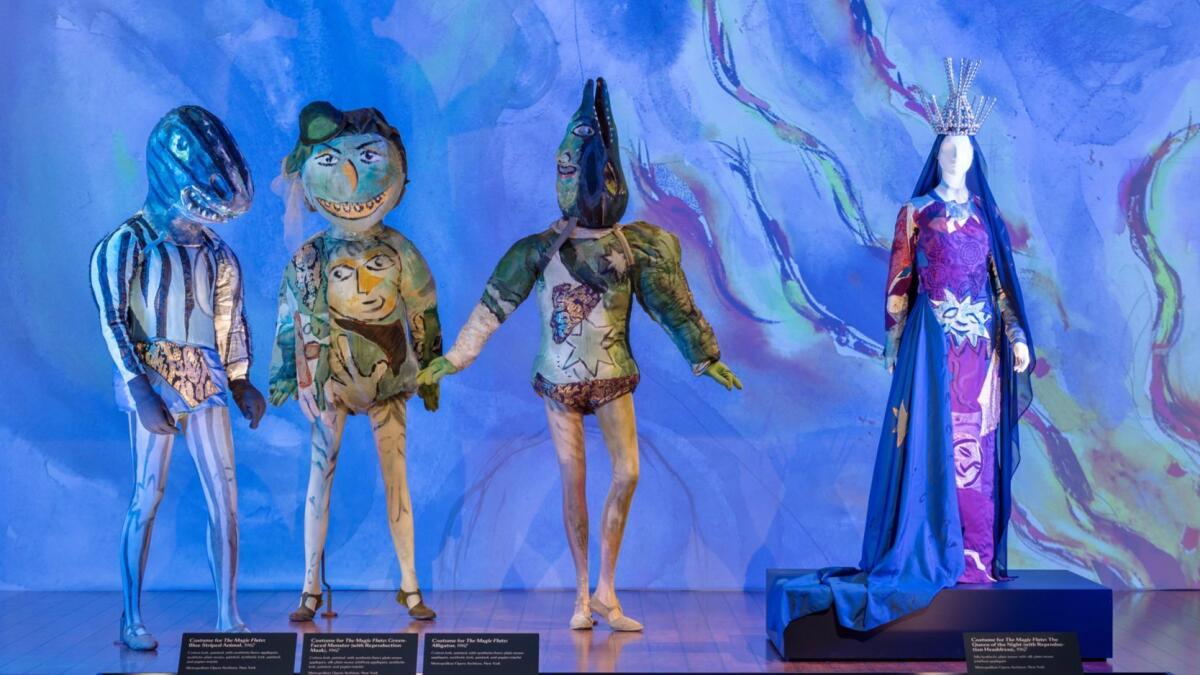
“Hollywood in Havana: Five Decades of Cuban Posters Promoting U.S. Films,” at the Pasadena Museum of California Art. Part of the Pacific Standard Time: Los Angeles / Latin America series, this exhibition gathers five decades of Cuban posters promoting Hollywood films such as “
Standing Rock: Art and Solidarity, at the Autry. The Standing Rock protest in North Dakota attracted an unprecedented protest that brought together native and non-native cultures in a unified front against the proposed Dakota Access pipeline. This exhibition gathers ephemera from that action, including poster art, clothing and photographs. Through Feb. 18. 4700 Western Heritage Way, Griffith Park, Los Angeles, theautry.org.
“A Universal History of Infamy,” at the Los Angeles County Museum of Art. The latest in the PST: LA/LA series brings together the work of 16 Latin American and U.S. Latino artists that challenge notions of region. Many of the artists don’t inhabit a single country — often going back and forth between multiple locations, cultures and ideas. The show includes installation and performance by artists such as Brazilian Carla Zaccagnini, who is preoccupied with history; Stefan Benchoam and Jessica Kairé, who manage an egg-shaped mini-museum in Guatemala; and Colombian Angeleno artist Gala Porras-Kim, whose work often explores the ways in which culture is presented and interpreted. The show will take place across three venues, including the BCAM galleries at LACMA, the museum’s exhibition space at Charles White Elementary School near MacArthur Park (opening Dec. 9), and the 18th Street Arts Center in Santa Monica (opening Sept. 9), where a number of the show’s artists had residencies. Through Feb. 19. 5905 Wilshire Blvd., Mid-Wilshire, Los Angeles, lacma.org.
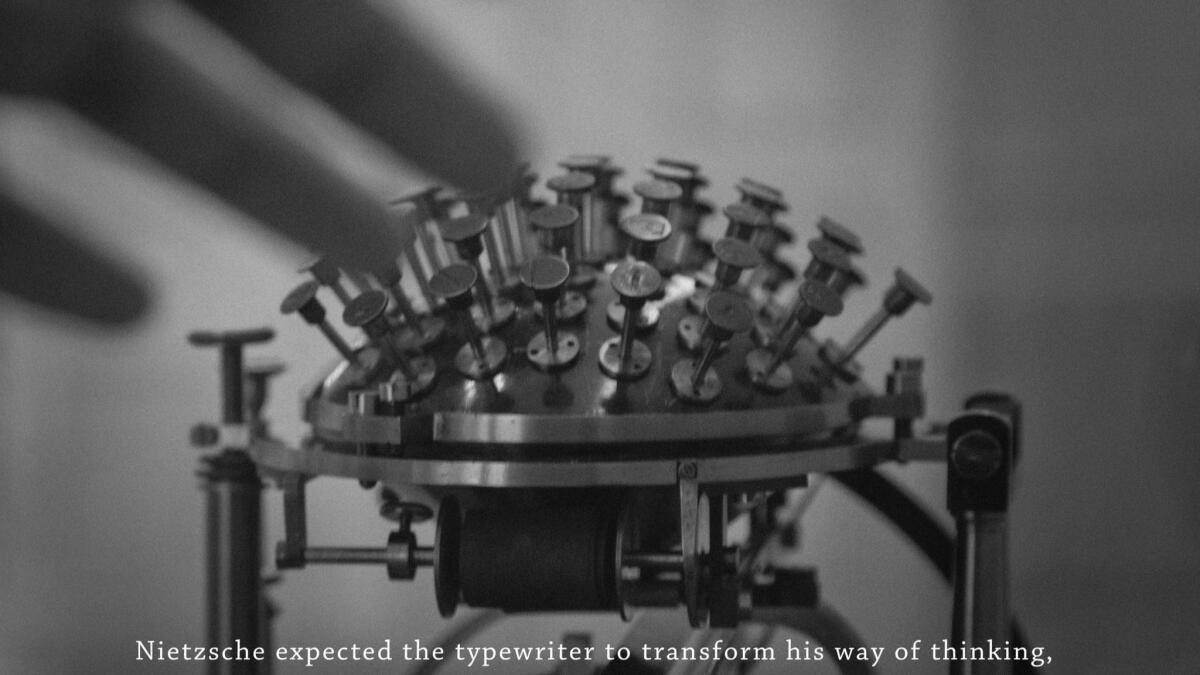
“Artists of Color,” at the Underground Museum. As part of its ongoing partnership with the Museum of Contemporary Art, the Arlington Heights arts space has put together an exhibition that focuses on color — on its aesthetics, as well as the roles color can play as a symbol, affecting the way it’s perceived both socially and politically. The show includes works by an array of artists, including Ellsworth Kelly, Dan Flavin, Lita Albuquerque, EJ Hill, Felix Gonzalez-Torres, Josef Albers, Carmen Herrera and Noah Davis (the late founder of the Underground Museum). It’s a striking look at color seen anew. On long-term view; no closing date set. 3508 W. Washington Blvd., Arlington Heights, theunderground-museum.org.
“L.A. Communities Through the Eyes of Artists,” in the Passageway Gallery at Union Station. For 15 years, L.A.’s principal train station has been showcasing work that reveals the city through the eyes of its artists. This year, it is showing a series of newly commissioned pieces — including Shizu Saldamando’s depiction of Little Tokyo, Sam
Alejandro G. Iñárritu, “Carne y Arena,” at LACMA. The gripping new virtual reality experience by the Academy Award-winning director places the participant in the shoes of migrants making the arduous trek through the Sonoran desert to reach the United States. This may sound like the trivialization of what can be a fatal journey, but it is not. Iñarritu has considered all of the elements that surround his virtual reality video to humanize the story of immigration on the U.S.-Mexico border. I wrote about my experience of the piece in June. It’s not cheap (it’s a $30 special admission, in addition to regular museum fees) but it’s worth every penny. On long-term view; no closing date set. 5905 Wilshire Blvd., Mid-Wilshire, Los Angeles, lacma.org.
“Pow! Wow!” in Long Beach. The public mural series held in Long Beach every year is back with a series of nearly two dozen new murals in locations around the city, including parking garages and underpasses. Murals will be on long-term view in locations around Long Beach, powwowlongbeach.com.
Daniel Hawkins, “Desert Lighthouse.” The Los Angeles-based artist is obsessed with producing works that toy with ideas of grandiosity, failure and gestures that border on the Sisyphean. (One of his goals as an artist is to ultimately build a scale replica of Hoover Dam.) Now Hawkins has installed a 50-foot tall, fully functioning lighthouse in the Mojave Desert in the vicinity of Barstow. The piece even features a light to guide travelers through this rugged landscape. Directions and coordinates can be found on the website. On long-term view, Hinkley, Calif., desertlighthouse.org.
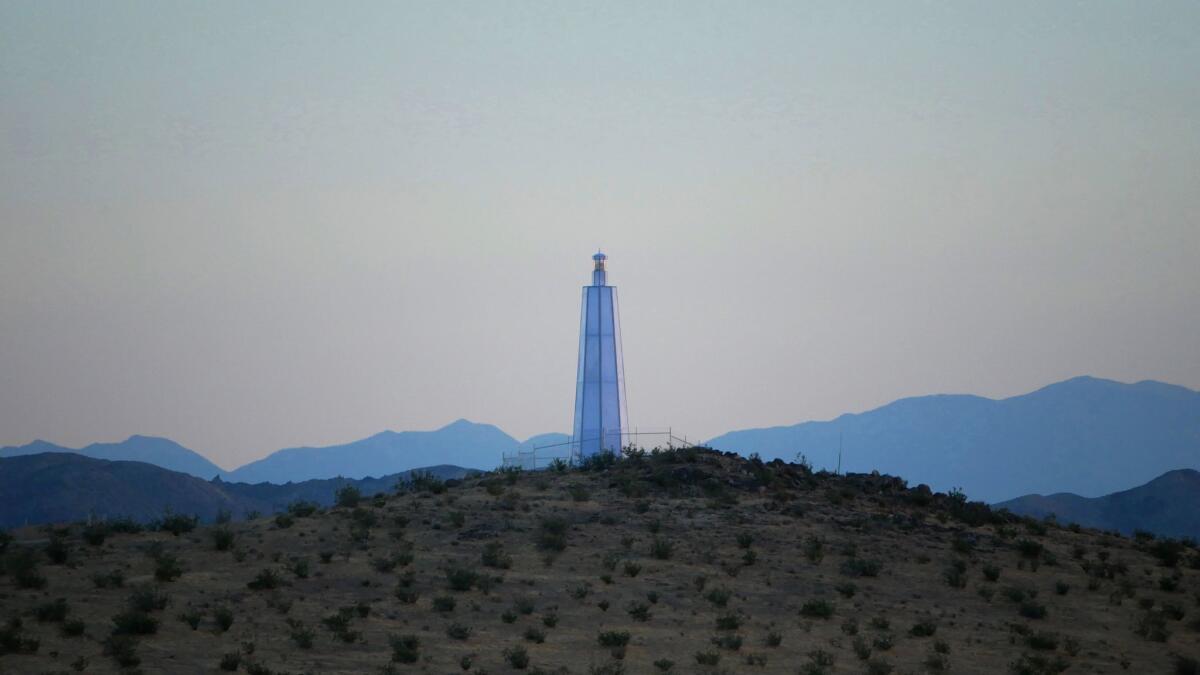
Sign up for our weekly Essential Arts & Culture newsletter »
Twitter: @cmonstah
The biggest entertainment stories
Get our big stories about Hollywood, film, television, music, arts, culture and more right in your inbox as soon as they publish.
You may occasionally receive promotional content from the Los Angeles Times.








